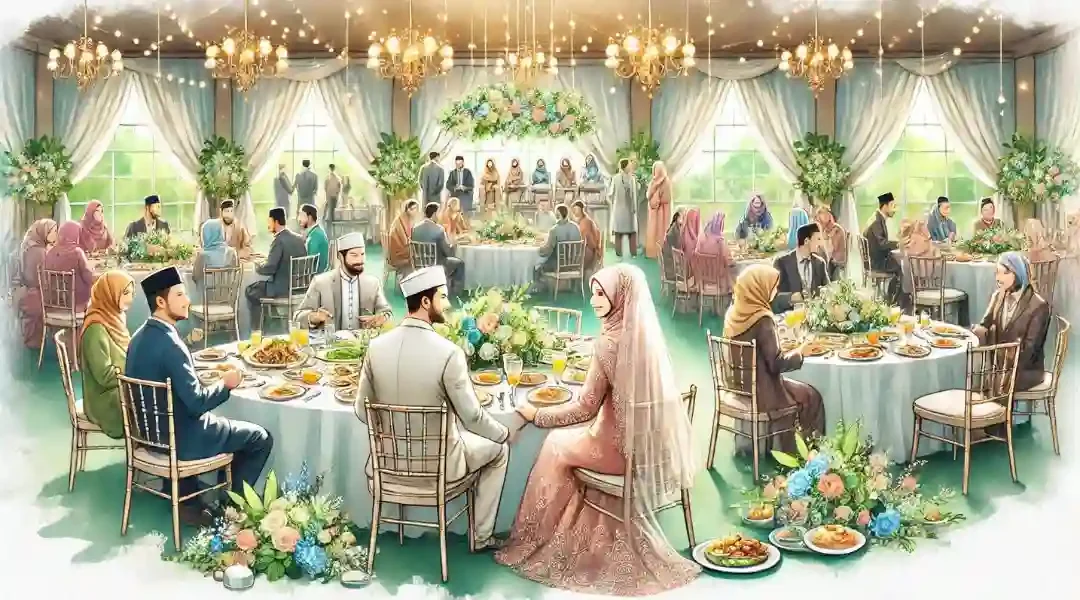Walima Meaning is an integral part of Islamic culture, celebrated as a joyous occasion following a significant event, most commonly a marriage. Derived from the Arabic language, walima carries a deep spiritual and social significance. This article delves into the meaning of walima, its purpose, and the traditional practices associated with it. We will also explore its role in strengthening social bonds within the Muslim community.
What Does Walima Mean?
The term “walima” originates from the Arabic root word w-l-m, which means “to gather” or “to assemble.” In Islamic tradition, walima refers to a feast or gathering, primarily hosted after a marriage to announce and celebrate the union publicly.
Religious Context of Walima
In Islam, walima is not merely a celebration but also a Sunnah (practice) of Prophet Muhammad (PBUH). Hosting a walima feast is considered a form of gratitude to Allah and a way to share the blessings of the marriage with others.
The Purpose of Walima
Walima serves multiple purposes, both spiritual and social:
- Public Declaration of Marriage: It fulfills the Islamic requirement of announcing a marriage to the community.
- Gratitude to Allah: The feast is an expression of thankfulness for the blessings of marriage.
- Strengthening Community Ties: Walima fosters unity and goodwill by bringing together family, friends, and neighbors.
- Charity: It provides an opportunity to share with those in need, aligning with the principles of generosity in Islam.
How to Organize a Walima Feast
1. Choosing a Venue
The venue can be as simple as a home setting or a grand banquet hall. The choice depends on the size of the gathering and the host’s preferences.
2. Preparing Food
Food is the centerpiece of a walima. The feast typically includes:
- Rice dishes (e.g., biryani or pilaf)
- Meat-based curries or roasts
- Bread varieties like naan or pita
- Desserts such as baklava or kheer
3. Inviting Guests
Guests usually include close family, friends, and members of the community. In Islam, it is encouraged to invite both affluent and less fortunate individuals to promote inclusivity.
4. Decorations and Ambiance
Decorations can range from simple floral arrangements to elaborate themes, reflecting the joyous nature of the occasion.
Walima Across Cultures
While the core essence of walima remains consistent, cultural variations add unique flavors to the celebration:
- South Asian Walima: Often a grand event with traditional attire and lavish decorations.
- Arab Walima: Typically includes cultural dances and a variety of local dishes.
- African Walima: May feature vibrant music and community participation.
- Western Walima: Combines Islamic traditions with modern elements like formal dining settings.
Etiquette for Attending a Walima
If you’re invited to a walima, follow these guidelines:
- Dress modestly, respecting Islamic customs.
- Bring a gift for the couple, such as household items or monetary contributions.
- Participate in the meal and festivities with gratitude.
- Avoid actions that may disrupt the spiritual and social harmony of the event.
Frequently Asked Questions (FAQs)
1. Is it obligatory to host a walima?
Walima is a Sunnah and not an obligation. It is highly recommended for those who can afford it.
2. Can walima be hosted on a different day from the wedding?
Yes, the timing of the walima can be adjusted based on convenience and cultural practices.
3. Who is responsible for organizing the walima?
Traditionally, the groom’s family organizes the walima, though this may vary across cultures.
4. Can a small walima be acceptable?
Absolutely. The essence of walima lies in sharing joy and blessings, irrespective of the scale.
5. Is it mandatory to serve meat at a walima?
No, the choice of food depends on the host. The emphasis is on hospitality and sharing, not on specific dishes.
Conclusion
Walima is more than a celebratory feast; it is a reflection of Islamic values such as gratitude, community, and generosity. While its practices may vary across cultures, the underlying spirit of unity and joy remains universal. Hosting or attending a walima is a reminder of the blessings of togetherness and the importance of sharing those blessings with others.
Whether simple or grand, the essence of a walima lies in its purpose of celebrating love, fostering connections, and expressing gratitude to the Almighty.
















